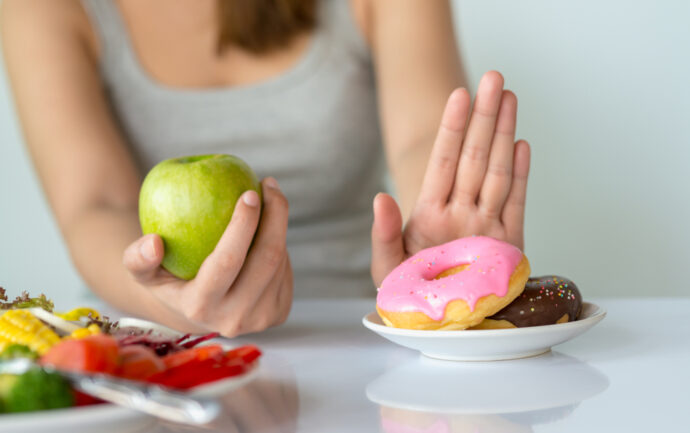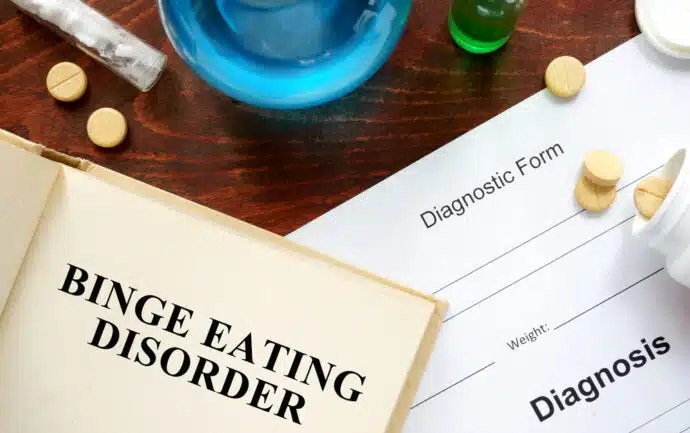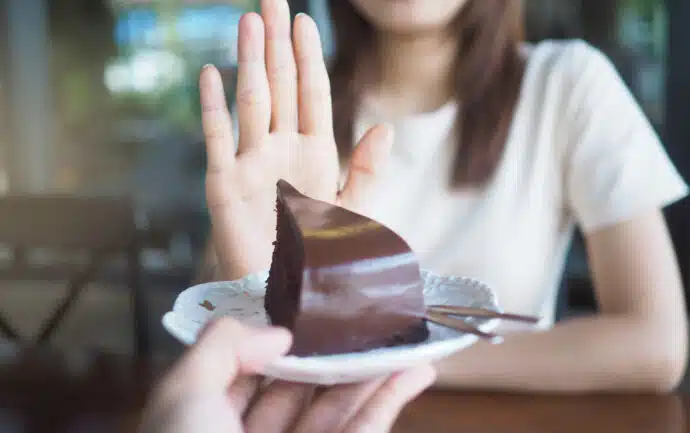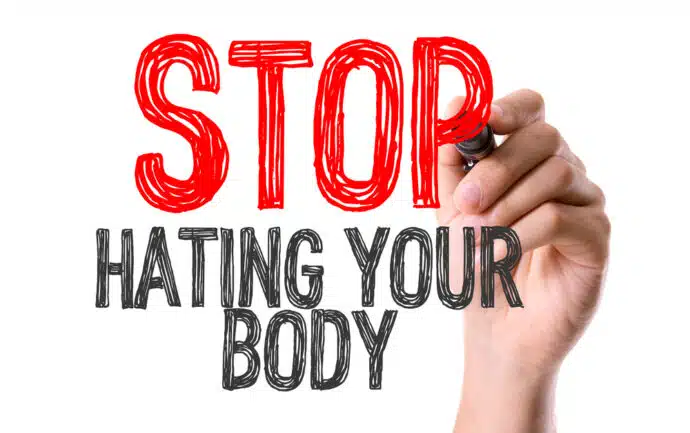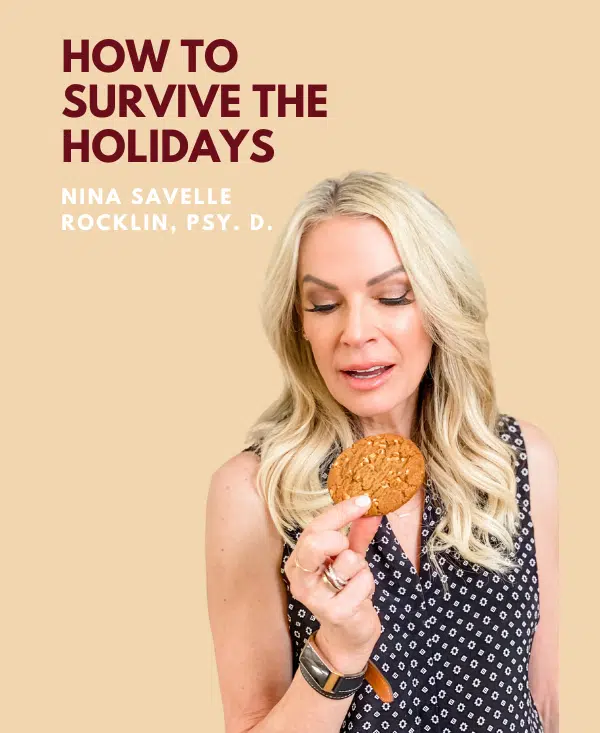Table of Contents
- What is emotional eating?
- Is emotional eating an eating disorder?
- Let’s understand the most common forms of emotional eating.
- Should I be worried about emotional eating?
- Make peace with yourself
- FAQs
Cami broke up with her boyfriend and immediately dove into a pint of chocolate ice cream. She polished it off and ordered more from Postmates.
Lucinda barely eats anything during the day because she’s so busy. As soon as she gets home from work, she starts snacking and can’t seem to stop, and it often turns into a binge.
Jessica always looks forward to having wine, cheese, and crackers after work as a way of managing stress. She often eats to the point of discomfort and goes to sleep in miserable pain.
Two of these women are emotional eaters and one is not.
Can you guess which one?
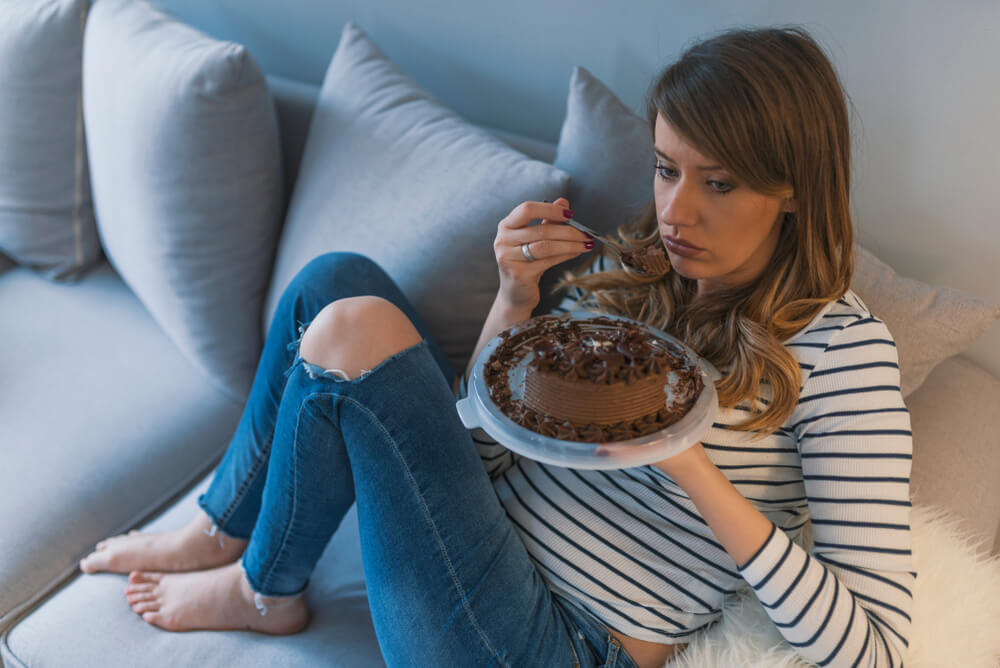
The answer is… Lucinda. She’s bingeing out of deprivation and hunger. She doesn’t eat enough during the day and she gets so ravenous that it takes a while to feel full.
Cami and Jessica are using food to resolve something psychological, which is the basis of what’s often termed “emotional eating.”.
What is emotional eating?
Emotional eating simply means eating to change the way we feel. Cami was eating ice cream because she was really upset. Jessica ate cheese and crackers as a way of resolving stress. These are both examples of emotional eating.
We turn to food because of our emotions and internal conflicts. Sometimes, we want to avoid our emotions and food can serve as an instant remedy.
While it is okay to rely on food once in a while when we’re upset (it’s only human) when it becomes more frequent or reaches a point where it’s uncontrollable, then it’s a problem.
Is emotional eating an eating disorder?
Some types of eating disorders include emotional eating, but it’s not an eating disorder on its own. Eating disorders are complex psychological conditions that develop as a result of a number of factors, including temperament, environment, and culture.
Let’s understand the most common forms of emotional eating.
Binge Eating Disorder
Binge eating occurs when we feel an uncontrollable urge to eat even when we’re not hungry. We feel unable to stop ourselves and, sometimes, eat without even tasting or enjoying the food, often eating until we’re beyond full. This is followed by intense shame and guilt about our behavior. Maybe we cringe when we think about what people would think of us if they knew the truth, and our self-esteem suffers because of it.
Bulimia
Bulimia is bingeing, followed by some form of purging. People struggling with bulimia may throw up the food they just ate, or they may exercise compulsively, or restrict themselves from food, following the binge.
On the surface, bulimia is seen as a way of having one’s cake and eating it, too. Yet, bulimia is a highly symbolic behavior. It can express conflict about wanting or needing relationships or other things in life. Taking in food and then getting rid of it can feel empowering. Several patients had what I call “financial bulimia” as they’d go on shopping binges and then return everything. Understanding each person’s individual reasons for bulimia is important, as it is with all forms of eating disorders.
Anorexia
Anorexia is characterized by an obsession about losing weight. People with anorexia starve themselves, often into emaciation, yet cannot see that they’ve become too thin. Anorexia is often misunderstood as being about vanity or appearance. For some people, going on a diet can morph into anorexia, but dieting does not always lead to anorexia.
Psychologically, restricting is associated with denial of basic needs, conflicts over entering a new stage of life, and issues of control and identity.
Orthorexia
Orthorexia is not a clinically diagnosable eating disorder but it’s a disordered condition that impacts many people. In simple terms, it’s an unhealthy obsession with eating healthy food. The primary focus is on eating super-healthy, along with an obsession about the purity of food.
While consciously, people with orthorexia are just trying to “be healthy” there’s usually an underlying mental conflict about anything messy in life. Some people with orthorexia are unconsciously trying to clean up their lives and emotions by eating healthily.
These are the most common forms of disordered eating. If you’re struggling with something different and want to know more about it, comment below. I’d be happy to help you out 🙂
Keep in mind that the symptoms, reasons and behaviors for problematic eating vary from one person to another. We all are unique. Our actions rely heavily upon our mindset, thought processes and experiences. Our feelings, opinions, desires and past also influence our relationship with food.
Should I be worried about emotional eating?
Emotional eating is more common than what we perceive it to be. If you turn to food rarely or once in a blue moon, it is okay. But, if it happens regularly or is turning into a habit, then it is a problem. If you often blame yourself or end up saying “What’s wrong with me?,” you should pay attention to that as a warning sign. In my book, Binge Cure:7 Steps To Outsmart Emotional Eating, I delve deeper into signs of emotional eating and how to permanently leave the behavior behind, all without dieting or even thinking about food.
Make peace with yourself
Remember that food is not the problem, it’s a solution to the problem. The real problem lies deep within (sometimes it’s hidden from us in our unconscious). The good news is that when you identify the emotions leading to unhealthy behaviors and cultivate healthier ways to respond to yourself, you’ll be able to stop the behavior.
To learn more about this, follow me on Instagram and join my Facebook community to meet people dealing with similar problems.
FAQs
Why do I eat emotionally?
Emotional eating is a way of coping with emotions or situations. It’s hard to be conflict with your partner, to deal with an exhausting job or process childhood trauma. Eating provides soothing and distraction, but ultimately it hurts you. I call emotional eating a “frenemy” because it helps you in some way, by comforting or distracting you, but it also hurts your body and your self-esteem.
How do I know if I’m emotionally hungry or physically hungry?
If you’re unsure whether or not you’re eating emotionally, here’s a quick activity that you can try.
The next time you feel an urge to eat, try to postpone your meal or snack for 3 minutes and see what happens.
If you get a little bit hungrier then you're physically hungry. But if you start having feelings of anxiety, frustration, nervousness, sadness, loneliness, or other emotions, then you're emotionally hungry. The delay pushes your underlying emotions to surface as the intensity grows. Learn more about it here
I tend to binge eat during holidays. Should I be worried about it?
We often mistake bingeing for overeating. Everyone overeats on occasion but bingeing is a specific behavior that is compulsive and associated with shame, secrecy, and self-hatred. It’s important to differentiate between the two so you can take care of yourself the right way.
Get 'The Binge Cure: 7 Steps to Outsmart Emotional Eating'
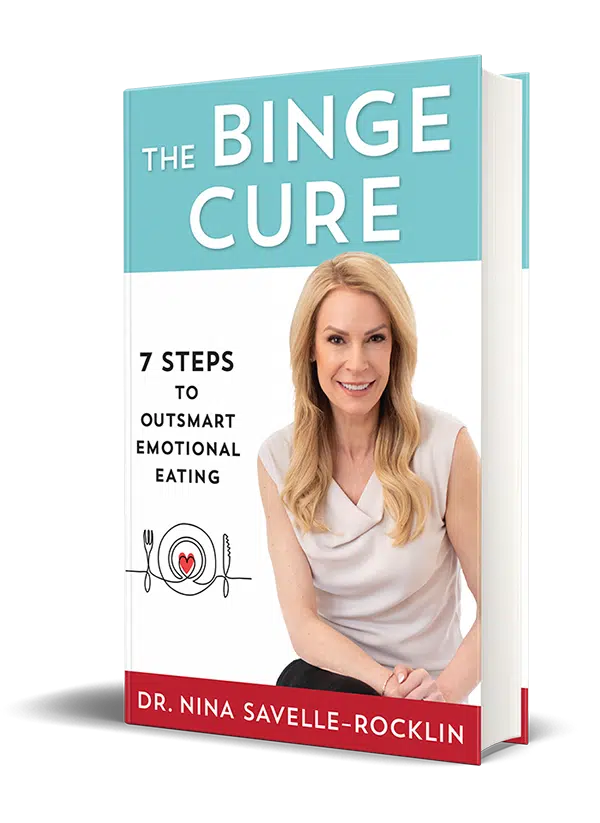
The Author

Dr. Nina Savelle-Rocklin is a psychoanalyst, author and radio host specializing in binge eating disorder. She is the author of The Binge Cure: 7 Steps to Outsmart Emotional Eating and Food for Thought: Perspectives on Eating Disorders, and co-editor of Beyond the Primal Addiction. She hosts The Dr. Nina Show radio program on LA Talk Radio.
Related Blogs
